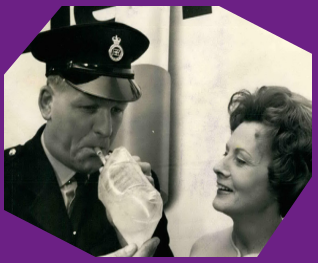PACTS is currently undertaking a research project ‘Drink driving – taking stock and moving forward’ following the award of a Department for Transport Road Safety Grant in May 2019. The project will be undertaken in partnership with the University of Stirling and is a multi-disciplinary review of recent drink driving trends, practice and interventions in the UK. The research aims to provide new, up-to-date insights into the behaviour, mind-set and circumstance of drink drivers, by drawing from in-depth interviews with drink drive offenders in England and Scotland. The project’s overall purpose is to provide a multi-disciplinary understanding of the reasons for drink driving, from road safety and public health perspectives, and the likely effectiveness of various interventions.
Context
The dangers of drink driving have been quantified since 1964 when Borkenstein et al first established a clear link between alcohol consumption and traffic collision risk. In 1967, a blood alcohol concentration (BAC) limit for drivers in the UK was introduced by the Road Safety Act. Since 1979, when accurate monitoring was introduced, casualties involving drivers over the legal drink drive limit have decreased by 73%. Combating drink driving is seen as one of the major successes of road safety and campaigns to significantly change public attitudes and behaviour.
Yet fifty years on, drink driving remains one of the major causes of road deaths. Since 2010, there have been around 240 deaths a year in Great Britain involving drivers over the legal drink drive limit. This amounts to some 13% of total road deaths. In 2017, provisional estimates suggest 250 people died as a result of drink driving and a further 1110 were seriously injured. These figures exclude an estimated 50 additional deaths involving drivers impaired by alcohol yet below the legal limit.
The data suggest that current drink driving practice and interventions are not making sufficient inroads. Moreover, there is not an up to date overview of the drink drive “problem” or a strategy to address drink driving. Therefore, a detailed reassessment of the problem and policy options is needed.
The Research
The study will assemble and analyse qualitative and qualitative evidence on the following lines of inquiry regarding drink driving:
- The scale and trends in the road casualties involving drink drivers;
- The profile of drink drivers
- Police drink drive intelligence and enforcement activity
- Judicial activity (prosecutions, convictions, sentencing, rehabilitation courses, etc.)
- The perceptions of drink drivers and their reasons for drink driving, including alcohol dependence
- Developments in drink drive policy and interventions.
The project is a multi-disciplinary review of recent drink driving trends, practice and interventions in the UK. It will provide up-to-date insights into the behaviour, mind-set and circumstance of drink drivers. These insights will come from two main sources:
- Information provided to PACTS by key experts, stakeholders and practitioners;
- In-depth interviews with drink drive offenders in England and Scotland undertaken by the University of Stirling (Institute for Social Marketing, Faculty of Health Sciences & Sport).
The end product of this research will be a report which will summarise the evidence, conclusions and recommendations. The report will be published in May 2020. Appendices and supplementary reports providing more detailed information may follow. PACTS and the University of Stirling hope the project will inform interventions which reduce drink driving and the harm that it causes.

